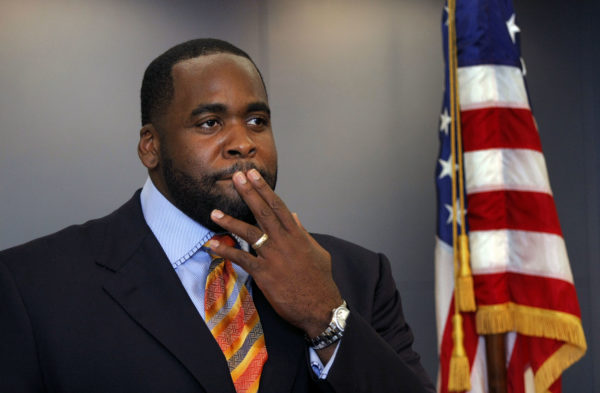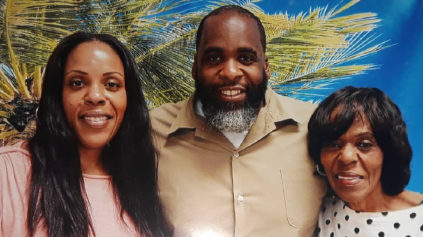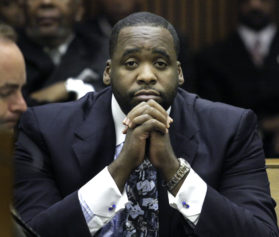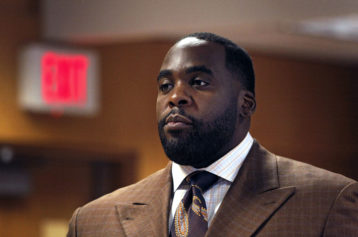In response to former Detroit Mayor Kwame Kilpatrick’s newest attempt to have the judge presiding over his case disqualified, the U.S. Attorney’s Office has doled out some fierce criticism.
A 22-page legal brief prosecutors filed Friday, May 3, details the court’s feelings on the filing from Kilpatrick, who has tried for years to have U.S. District Judge Nancy Edmunds taken off his case.

“In Kwame Kilpatrick’s view, the blame for his corruption convictions lies with everyone but him,” Assistant U.S. Attorney Andrew Goetz wrote in the court filing obtained by local news outlets. “He has never apologized, never accepted responsibility — never shown any remorse for extorting millions of dollars from Detroit city contractors. Instead, he has lashed out at every possible scapegoat: the government, the media, his attorneys, and, now, this court.”
Kilpatrick is in year eight of a 28-year prison sentence stemming from running a criminal operation from City Hall that steered water and sewer contracts to his longtime friend Bobby Ferguson. In April, Kilpatrick filed a motion to have Edmunds recuse herself from the case, alleging the judge sent his trial attorney James C. Thomas a wedding card during litigation. That, according to the former mayor of Motor City, illustrated Edmunds and his counsel had a personal relationship, which he deemed a conflict of interest. As such, Kilpatrick wanted Edmunds not to preside over any other attempts to turn over his conviction and sentence.
However, Goetz said that doesn’t justify Edmunds’ removal, adding that sending a congratulatory wedding card doesn’t mean Thomas and Edmunds are close.
“Kilpatrick’s new ‘wedding card’ allegation, even if true, suggests only a professional acquaintanceship between the Court and Thomas,” Goetz wrote. “Wedding cards are a small and familiar way to congratulate new couples on their nuptials. They are a common pleasantry among neighbors, distant friends, professional colleagues, and other acquaintances — a far wider circle than just intimate friends and close family. And because sending a wedding card is so ‘common’ and so widespread, it would not ‘appear to a knowledgeable observer as a sign of partiality.'”
Additionally, the U.S. attorney also pointed out how odd it is that Kilpatrick would say there was bias in favor of his own lawyer.
“Kilpatrick’s argument is also odd for another reason: he’s contending not that the court was biased in favor of the government’s attorneys, but that the court was biased in favor of his attorney,” Goetz said in the decision. “It is unusual for a litigant to complain that a judge views his chosen counsel favorably.”
This marks the latest time Kilpatrick has tried to get his sentence tossed or the players in his case changed.
In March the former politician’s motion arguing that inconsistencies, among other things, led to his conviction and he should thus be set free was rejected by Edmunds. Before then, Kilpatrick hoped to be one of the prisoners whose sentence would be commuted by President Donald Trump. His lengthy plea to reduce his sentence, which is tied with one other as the longest sentence in U.S. history for public corruption, went unanswered.


